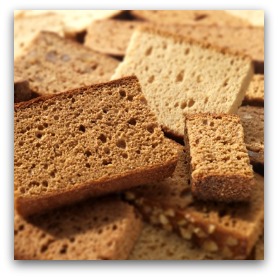 It isn't often that a product in the supermarket underlines the disconnection of your family from its ancestral culture. Browsing the international food section of Coles last week, I came across a hitherto undiscovered area – the shelf of sugary Dutch delights. As I stared at the treats on offer Melbourne faded into sepia around me – I was a mere credit card swipe from the land of dikes and type-2 diabetes. Packets of chocolatey goodies, almond flavoured everythings, and, most intriguingly, a loaf-shaped product called 'Breakfast Cake' tumbled into my trolley. I happily pushed my cart of insulin overload towards the checkout and took my place in a queue. As I waited I picked up the heavy log of Breakfast Cake and turned to the text on its back, hoping that similar products were available to fill cake gaps in my lunch and dinner menus. And here the underlining began.
It isn't often that a product in the supermarket underlines the disconnection of your family from its ancestral culture. Browsing the international food section of Coles last week, I came across a hitherto undiscovered area – the shelf of sugary Dutch delights. As I stared at the treats on offer Melbourne faded into sepia around me – I was a mere credit card swipe from the land of dikes and type-2 diabetes. Packets of chocolatey goodies, almond flavoured everythings, and, most intriguingly, a loaf-shaped product called 'Breakfast Cake' tumbled into my trolley. I happily pushed my cart of insulin overload towards the checkout and took my place in a queue. As I waited I picked up the heavy log of Breakfast Cake and turned to the text on its back, hoping that similar products were available to fill cake gaps in my lunch and dinner menus. And here the underlining began.
The back label of my taboo-smashing pre-10am cake was covered in an unintelligible language, which I could only presume was Dutch. What I had thought a tasty sounding Breakfast Cake was apparently also known less appetisingly as an 'Ontbijtkoek'.
It was at this point that I was faced with an uncomfortable realisation. I can neither read nor speak Dutch. And by all rights, I should be able to do both. My grandparents were Dutch. My New Zealand-born father speaks Dutch. My foreign-born uncles still have Dutch accents half a century after they moved here. But my knowledge of Dutch and the culture of the Netherlands extends to, and not beyond, a taste for salty liquorice.
My sister and I are the products of what could be seen as a perfect example of migrant assimilation. We are the second generation of a family that arrived in Australasia with minimal English and no friends, slotted themselves into menial work and adapted to an alien culture where cake was strictly avoided before 10am. On the surface we are textbook examples of what many say migrants should do when they arrive in Australia. Under the surface the waves of shock and cultural loss still ring through our family.
Migrants are expected to love their new country almost unreservedly and conform to the new world they have become a part of. If they are willing to completely blend in, they are categorised as model migrants and keen new citizens – the people we want. If they disagree with some aspects of the culture of their new home they are seen as ungrateful whinging foreigners – the people we don't want. Most migrants would find themselves at neither of these extremes of assimilation and in a microcosm of what has no doubt happened to millions of families, my grandparents' integration into their destination country was uneven. My Grandfather mastered English, embraced local mores, made local friends, and started a business. My Grandmother pined for her homeland, ignored local customs, socialised almost exclusively with Dutch speakers and remained locked in linguistic isolation for the rest of her life. All through my childhood, on Sunday afternoons over tea and windmill-shaped biscuits, my inability to speak Dutch would clash with my Grandmother's inability to speak English.
Visits to their home would be spent with Grandma warbling away in Dinglish, uttering one intelligible word in 10 while I nodded along and smiled enthusiastically, an antipodean Manuel to her continental Basil Fawlty. Yet while we all remarked on how hard it was to understand her, and how amazing it was that a woman who had been in New Zealand for decades (against her will, as I later found out) couldn't speak English, there was never any thought of my sister or I learning the tongue of our heritage. Rather, my father would be called over to interpret between the old world of my grandmother and the new one of her grandchildren.
This linguistic barrier was so normal, so a part of my family, that it was simply accepted and left to be. Dad taught me how to call someone "a sack of balls" in Dutch and left my education of my ancestral language at that. So it was with most other elements of Dutch culture. I grew up, left home, and finished university before I realised that a whole swathe of my family's history and heritage had simply dissolved away. It was only when I met someone from another Dutch migrant family who spoke the language and knew the culture that some of my grandparents' seemingly odd behaviour was explained. Every Christmas and birthday they would give me a big chocolate S for Scott. It was only from my bi-lingual friend that I found out this was an old Dutch tradition, rather than a strange confectionary-based attempt to improve my ABCs.

It's not that we were desperately trying to integrate ourselves into the local culture – it's just that my parents didn't teach us about our background. We discarded our culture like an old jumper, rescuing it from the wardrobe on occasion to eat Dutch food and justify our odd surname, before throwing it back in to moulder. My disconnection from the land of my ancestors was such that when the opportunity for a Dutch passport arose, I turned it down.
Is Australasian culture so seductive that migrants discard their own traditions in their rush to embrace it? Or was there something else at play? Looking at my own family I wonder how the trauma of relocation affected us. In a situation not entirely dissimilar to that of many people in detention centres around Australia, my grandparents survived the German occupation of Holland, and left behind them a Europe that was struggling to rebuild. They moved to 1950s New Zealand, a place that was physically far from Europe, and culturally almost as distant. My Grandmother, who never wanted to move in the first place, found herself transplanted from the bustling café sophistication of The Hague to the sheep farming and milky tea world of semi-rural New Zealand. The cultural and geographic isolation must have been enormous, and she rebelled. On the days when her frustration became uncontrollable she would walk out to the nearby state highway and throw rocks at passing cars.
Her unhappiness was so evident that when she and my 10-year-old father visited Europe they returned to find that my grandfather had sold their possessions – he had simply assumed that his wife and son wouldn't come back. My father's recollection of his childhood is littered with similar unhappy memories. He caught the brunt of his parents' marital tensions and fled the family home at the earliest age the law would allow. It isn't hard to understand why he might have rejected a large part of his past and neglected to pass elements of it onto his children. Teaching my sister and I the language of his melancholy memories would have meant painfully revisiting a time he would rather have forgotten.
Assimilation is so often trumpeted as the solution to the problems migrants face, but assimilation is as much about loss as it is about gain. When we ask the people who come here to adopt our culture or face ostracism, we must understand what we are demanding of them and the pain that they and their families can go through in trying to meet our expectations. Australia's many waves of migrants, who have integrated into the mainstream despite the naysayers who decried their arrival, have all preferenced aspects of their new world over their old in order to fit in. Every migrant family has its own story of cultural gain and cultural loss. Even two generations later we grandsons and granddaughters of those who had to choose which traditions to keep, and which to discard, sometimes can't help but feel a pang of sadness at the loss of our old culture in favour of our new.
I brought the Ontbijtkoek home, and the next morning I buttered a piece for breakfast. The flavour was strange and foreign. I guess I never developed a taste for it. I wrapped it back up, and put it in the pantry. Should I meet a Dutch person who is new to Australia I'll offer them a slice. I hope that this small gesture of acceptance will let them know that their culture is as welcome here as they are.
 Scott Steensma was third place winner in Eureka Street's 2010 Margaret Dooley Award for young writers.
Scott Steensma was third place winner in Eureka Street's 2010 Margaret Dooley Award for young writers.